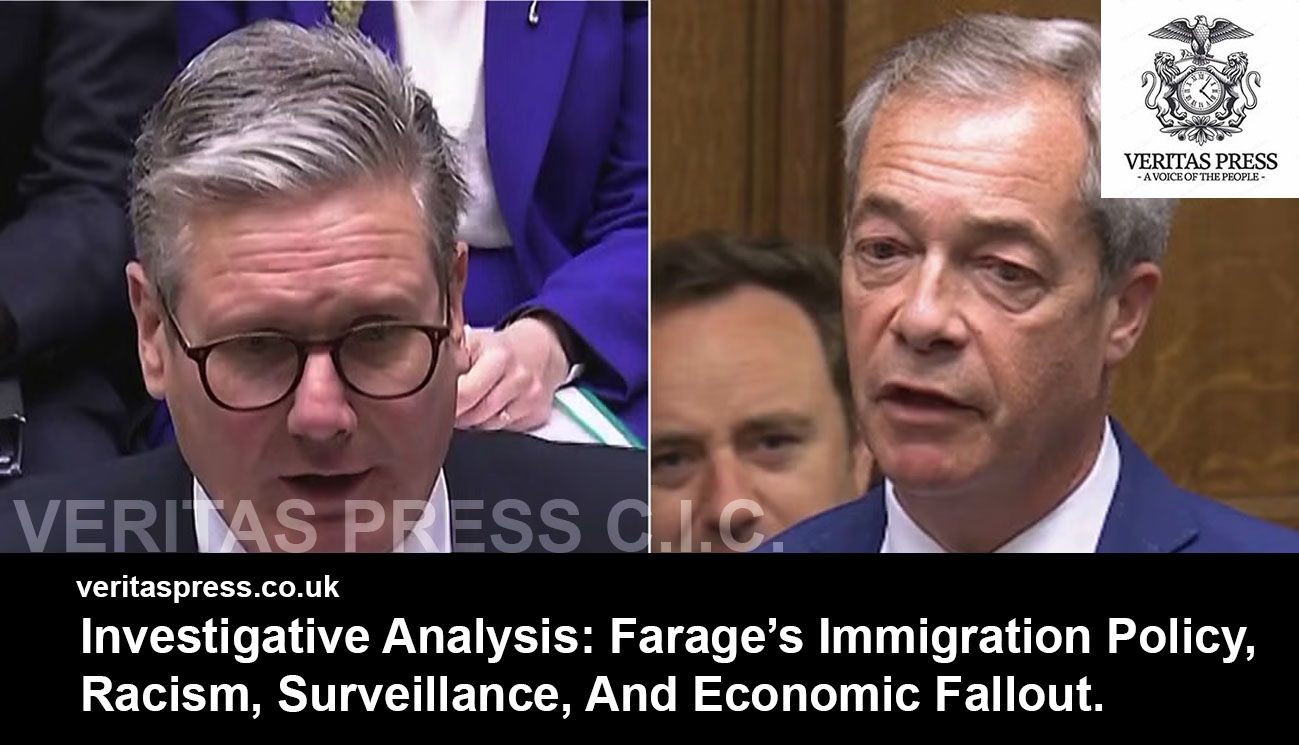Nigel Farage’s leadership of Reform UK has thrust the party into one of the most controversial immigration debates in modern British politics. At the centre of the storm is the proposal to abolish indefinite leave to remain (ILR), forcing hundreds of thousands of migrants, many of whom have lived and worked legally in the UK for years, to reapply under stringent, financially driven criteria. Prime Minister Keir Starmer has branded the plan “racist and immoral,” warning that it could “tear this country apart.”
Policy Overview: From ILR To Stricter Controls.
Reform UK’s proposal would revoke ILR for non-EU migrants, requiring them to reapply under higher salary thresholds and limited access to public services, while applicants for citizenship would have to renounce other nationalities. Farage claims these measures will reduce welfare dependency and incentivise economic contribution, but analysts warn that they disproportionately target non-EU migrants and risk destabilising communities that have integrated into UK society.
Steve Reed, Housing Secretary, commented:
“People who are lawfully working in this country will now be under scrutiny that affects every aspect of their lives. This is unprecedented in modern Britain.”
Racialised Implications and Far-Right Parallels:
Farage’s rhetoric and policies draw uncomfortable parallels with far-right movements, particularly the English Defence League (EDL), which has historically mobilised around anti-immigrant and nationalist sentiment. Sociologist Dr. Sara Ahmed noted:
“By targeting lawfully settled migrants, the message is clear: non-white, non-European communities are under constant suspicion. This is not just policy, it is racialised surveillance dressed as governance.”
Labour Party analysis argues that the policy constructs a hierarchy of belonging, implicitly privileging white European migrants over others and stoking xenophobic narratives similar to those promoted by extremist street movements.
Surveillance And The “Big Brother” Effect:
Abolishing ILR would place legal migrants under 24-hour government oversight, requiring continuous proof of legal status, employment, taxes, and community contribution. The policy risks creating a climate of fear and discouraging professional and skilled labour participation. Immigration lawyer Ayesha Khan warned:
“This policy would make lawfully settled individuals second-class citizens. The legal, social, and economic fallout will be immense and disproportionate to any alleged benefit.”
Analysts highlight potential brain drain in critical sectors such as healthcare, education, and technology, as migrants may leave the UK to avoid intrusive monitoring. Employers could face increased administrative burdens, threatening productivity and service provision across key industries.
Public And Political Reactions:
Starmer has repeatedly emphasised the societal risks of Reform UK’s proposals. Speaking at the Labour Party Conference in Liverpool, he said:
“They are our neighbours. They’re people who work in our economy. They are part of who we are. It will rip this country apart.”
Polling by More in Common and Survation shows the public is deeply divided: some see Farage’s proposals as a solution to immigration concerns, while others regard them as discriminatory. Reform UK leader Nigel Farage has dismissed criticisms as politically motivated, with head of policy Zia Yusuf tweeting:
“Labour’s new message to the British electorate just dropped: ‘Pay hundreds of billions for foreign nationals to live off the state forever, or we’ll call you racist!'”
The debate underscores a generational struggle over migration, national identity, and economic policy, highlighting the tensions between populist rhetoric and ethical governance.
Economic And Social Consequences:
Experts warn that removing ILR could destabilise labour markets and professional sectors. Workers in key industries may leave or be forced out, disrupting healthcare, education, and public services. Employers face bureaucratic challenges in verifying employee compliance, while migrants may reduce civic engagement due to fear of surveillance.
Dr. Ahmed added:
“This is a policy that does not just punish immigrants, it punishes society as a whole, by undermining trust, integration, and economic stability.”
Starmer’s Britcard Proposal: Inadequate And Racially Problematic.
In response to Reform UK’s policies, Prime Minister Keir Starmer has proposed the introduction of a BritCard, a digital identification system intended to streamline access to public services, employment and benefits for UK citizens. While the initiative aims to modernise public service delivery, critics argue that it is inadequate and racially problematic in the current political climate.
The BritCard proposal has been criticised for its potential to disproportionately affect non-white communities, particularly those from migrant backgrounds. Activists argue that the system could lead to further racial profiling and discrimination, as individuals from certain ethnic groups may be more likely to be scrutinised or denied services due to systemic biases.
Dr. Sara Ahmed, a sociologist specialising in race and identity, commented:
“The BritCard, in its current form, risks becoming a tool for exclusion rather than inclusion. Without robust safeguards, it could reinforce existing racial disparities and deepen social divisions.”
Furthermore, the implementation of the BritCard has raised concerns about data privacy and surveillance. Critics argue that the system could lead to the creation of a digital underclass, with individuals who are unable or unwilling to comply with the new requirements facing barriers to accessing essential services.
Ayesha Khan, an immigration lawyer, noted:
“The BritCard, when combined with policies like the abolition of ILR, could create a two-tier system where migrants and minority communities are subjected to heightened scrutiny and exclusion.”
Conclusion: The Dangerous Intersection Of Policy, Race, And Surveillance.
Farage’s immigration proposals reveal a convergence of racially charged rhetoric and far-right ideology, with echoes of EDL-inspired nationalism. His plan to abolish indefinite leave to remain (ILR) is not merely a policy adjustment; it is a political instrument that targets non-European migrants, transforming lawfully settled communities into objects of suspicion and control. By codifying exclusion based on nationality, ethnicity, and economic contribution, Reform UK legitimises narratives that cast minorities as outsiders, reinforcing social divisions in an already polarised Britain.
The economic consequences are profound. Legal workers in essential sectors, from healthcare to education, technology, and public services, would face constant surveillance, a “Big Brother” effect that discourages professional participation, drives talent abroad, and imposes significant administrative burdens on employers. Immigration lawyer Ayesha Khan warns that these measures risk rendering lawfully settled migrants into a permanent underclass, monitored not for wrongdoing but for their ethnicity and economic utility.
Meanwhile, Starmer’s BritCard, intended as a modernising measure, is similarly inadequate and potentially racially discriminatory. Without strong safeguards, it risks replicating the exclusionary dynamics of Farage’s proposals, restricting access to services for vulnerable communities and creating a digital underclass. Sociologist Dr. Sara Ahmed highlights that in this context, even ostensibly progressive policies can perpetuate structural inequality:
“The BritCard, in its current form, risks becoming a tool for exclusion rather than inclusion. Without robust safeguards, it could reinforce existing racial disparities and deepen social divisions.”
Beyond the ethical concerns, these combined policies pose serious economic and social risks, threatening the very industries, workers, and communities that rely on migrant contributions. The UK faces a stark choice: can immigration policy balance national interests with the rights, dignity, and economic contributions of lawfully settled migrants, or will it descend into a climate of state-sanctioned discrimination and surveillance?
Ultimately, the trajectory of UK immigration policy under Reform UK and the government’s digital initiatives underscores the urgent need for scrutiny. The stakes are high: unchecked, these policies could undermine social cohesion, destabilise key sectors, and institutionalise racialised exclusion. For policymakers, journalists, and the public, the challenge is clear: to demand policies that are inclusive, ethical, economically sound, and grounded in the principle that lawfully settled migrants are full members of British society, not subjects of perpetual suspicion.
Farage, ILR, And Starmer’s Britcard:
Key Officials & Political Statements:
- Keir Starmer, Prime Minister & Labour Leader:
“It is one thing to say we’re going to remove illegal migrants… It is a completely different thing to say we are going to reach into people who are lawfully here and start removing them. They are our neighbours. They’re people who work in our economy. They are part of who we are. It will rip this country apart.” - Steve Reed, Housing Secretary:
“People who are lawfully working in this country will now be under scrutiny that affects every aspect of their lives. This is unprecedented in modern Britain.” - Zia Yusuf, Head of Policy, Reform UK:
“Labour’s new message to the British electorate just dropped: ‘Pay hundreds of billions for foreign nationals to live off the state forever, or we’ll call you racist!’” - Shabana Mahmood, Home Secretary (on ILR changes in general):
“I am looking at how to make sure that settlement in our country – long-term settlement, indefinite leave to remain – is linked not just to the job you are doing, the salary you get, [but] also the wider contribution you are making to our communities.”
Experts & Analysts:
- Dr. Sara Ahmed, Sociologist:
“By targeting lawfully settled migrants, the message is clear: non-white, non-European communities are under constant suspicion. This is not just policy, it is racialised surveillance dressed as governance.”
“The BritCard, in its current form, risks becoming a tool for exclusion rather than inclusion. Without robust safeguards, it could reinforce existing racial disparities and deepen social divisions.”
- Ayesha Khan, Immigration Lawyer:
“This policy would make lawfully settled individuals second-class citizens. The legal, social, and economic fallout will be immense and disproportionate to any alleged benefit.”
Polling Data:
- More in Common / Survation, 2025:
- 65% of Labour Party members think the party is moving in the wrong direction.
- 64% think Starmer has performed poorly since taking office.
- 53% believe the party should change leadership before the next general election.
- 62% of the general public say Labour should focus on its own policies rather than attacking Reform UK.
- More in Common MRP Poll (pre-conference):
- Nigel Farage is projected to potentially enter Downing Street with a majority of 96 seats in a hypothetical general election scenario.
- Labour projected at just 90 seats, indicating significant erosion of support.
Media Coverage & Public Discourse:
- The Guardian:
- “Starmer calls Farage’s plan to deport lawfully settled migrants ‘racist’”
- “Reform UK’s plan could rip this country apart, warns PM”
- BBC News / Sunday With Laura Kuenssberg:
- Starmer emphasised the moral and societal risks of Farage’s proposals while defending Labour’s more measured reforms.
- Social Media Reaction:
- Farage posted charts from More in Common surveys, claiming the declining popularity of Starmer as justification for attacks.
Civil Society & Activists:
- Labour Party analysis:
- Reform UK’s ILR abolition constructs a hierarchy of belonging, privileging white European migrants and implicitly encouraging xenophobia.
- Community activists:
- Concerns were raised about surveillance creep, economic destabilisation, and social exclusion for established migrant communities.
Implications:
- Economic: Risk of brain drain in healthcare, education, and technology due to intrusive oversight of lawful migrants.
- Social: Potential erosion of trust, cohesion, and civic engagement.
- Ethical / Moral: Policies reflect racialised and exclusionary logic, mirroring far-right nationalist ideology (EDL).
- Digital / Surveillance: Starmer’s BritCard, without robust protections, may create a digital underclass vulnerable to profiling and service denial.


































Leave a Reply